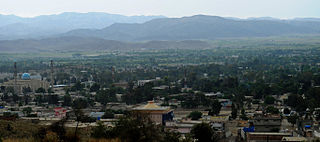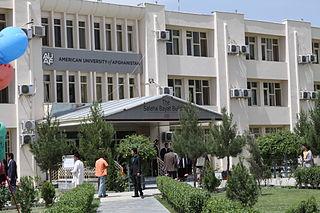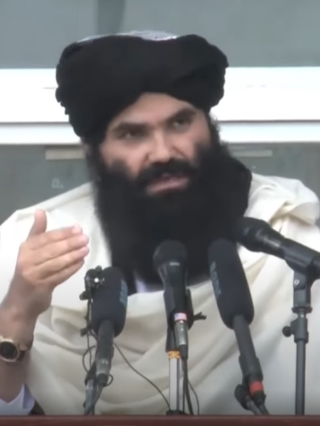Related Research Articles

The treatment of women by the Taliban refers to actions and policies by two distinct Taliban regimes in Afghanistan which are either specific or highly commented upon, mostly due to discrimination, since they first took control in 1996. During their first rule of Afghanistan, the Taliban were notorious internationally for their misogyny and violence against women. In 1996, women were mandated to wear the burqa at all times in public. In a systematic segregation sometimes referred to as gender apartheid, women were not allowed to work, nor were they allowed to be educated after the age of eight. Women seeking an education were forced to attend underground schools, where they and their teachers risked execution if caught. They were not allowed to be treated by male doctors unless accompanied by a male chaperone, which led to illnesses remaining untreated. They faced public flogging and execution for violations of the Taliban's laws.

Khōst is the capital of Khost Province in Afghanistan. It is the largest city in the southeastern part of the country, and also the largest in the region of Loya Paktia. To the south and east of Khost lie Waziristan and Kurram in Pakistan. Khost is the home of Shaikh Zayed University. The Khost Airport is located in the eastern area of the city.

Kandahār is one of the thirty-four provinces of Afghanistan, located in the southern part of the country, sharing a border with Pakistan, to the south. It is surrounded by Helmand in the west, Uruzgan in the north and Zabul Province in the east. Its capital is the city of Kandahar, Afghanistan's second largest city, which is located on the Arghandab River. The greater region surrounding the province is called Loy Kandahar. The Emir of Afghanistan sends orders to Kabul from Kandahar making it the de facto capital of Afghanistan, although the main government body operates in Kabul. All meetings with the Emir take place in Kandahar, meetings excluding the Emir are in Kabul.

Khost is one of the 34 provinces of Afghanistan located in the southeastern part of the country. Khost consists of thirteen districts and the city of Khost serves as the capital of the province. Historically, Khost used to be a part of Paktia and a larger region surrounding Khost is still referred to as Loya Paktia.
Parliamentary elections were held in Afghanistan alongside provincial elections on 18 September 2005. Former warlords and their followers gained the majority of seats in both the lower house and the provincial council. Women won 28% of the seats in the lower house, six more than the 25% guaranteed in the 2004 constitution.
The Zazi, also spelled Zazai, or Jaji, are a Karlani (کرلاڼي) Pashtun tribe. They are found in Afghanistan and Pakistan

Education in Afghanistan includes K–12 and higher education, which is under the Ministry of Education and Ministry of Higher Education. In 2021, there were nearly 10 million students and 220,000 teachers in Afghanistan. The nation still requires more schools and teachers. Soon after the Taliban take took the country in August 2021, they banned girls from secondary education. Some provinces still allow secondary education for girls despite the ban. In December 2022, the Taliban government also prohibited university education for females in Afghanistan, sparking protests and international condemnation. In December 2023, investigations were being held by the United Nations into the claim that Afghan girls of all ages were allowed to study at religious schools.

Sirajuddin Haqqani is an Afghan warlord and Specially Designated Global Terrorist who is the first deputy leader of Afghanistan and the acting interior minister in the internationally unrecognized post-2021 Taliban regime. He has been a deputy leader of the Taliban since 2015, and was additionally appointed to his ministerial role after the Taliban's victory over Western-backed forces in the 2001–2021 war. He has led the Haqqani network, a semi-autonomous paramilitary arm of the Taliban, since inheriting it from his father in 2018, and has primarily had military responsibilities within the Taliban.

Zazai Maidan District, may also be spelled as Jajai Maidan or Dzadzai Maidan, is located in the northeastern part of Khost Province, Afghanistan. The two "z" letters in Zazai are pronounced the same like in the first name of Hollywood star, Zsa Zsa Gabor.

Nadir Shah Kot District is situated in the western part of Khost Province, Afghanistan. It borders Paktia Province and Shamal District to the west, Qalandar District to the north, Musa Khel District to the northeast, Khost (Matun) District to the east, Mandozayi District to the southeast and Tani and Spera districts to the south.

Women's rights in Afghanistan have oscillated back and forth depending on the time period as well as the regime in power. After King Amanullah Khan's attempts to modernize the country in the 1920s, women officially gained equality under the 1964 Constitution. However, these rights were taken away in the 1990s through different temporary rulers such as the mujahideen and the Taliban during the Afghan civil war. During the first Taliban regime (1996–2001), women had very little to no freedom, specifically in terms of civil liberties. When the Taliban was overthrown by the United States following the September 11 attacks, women's rights gradually improved under the presidential Islamic Republic of Afghanistan. Women were de jure equal to men under the 2004 Constitution.
The Afghanistan women's national cricket team was the team that represented the country of Afghanistan in international women's cricket matches. The team was first established in 2010, but played only a single tournament amidst opposition from Islamists opposed to women's sport. An attempt at revival was made in 2020 when the Afghanistan Cricket Board awarded central contracts to 25 players. However, the team was disbanded following the 2021 Taliban offensive and capture of Kabul in accordance with the Taliban's ban on women's sport.
In May 2020, a series of insurgent attacks took place in Afghanistan, starting when the Taliban killed 20 Afghan soldiers and wounded 29 others in Zari, Balkh and Grishk, Helmand on 1 and 3 May, respectively. On 12 May, a hospital's maternity ward in Kabul and a funeral in Kuz Kunar (Khewa), Nangarhar were attacked, resulting in the deaths of 56 people and injuries of 148 others, including newborn babies, mothers, nurses, and mourners. ISIL–KP claimed responsibility for the funeral bombing, but no insurgent group claimed responsibility for the hospital shooting.
Protests in Afghanistan against the Taliban started on 17 August 2021 following the Fall of Kabul to the Taliban. These protests are held by Islamic democrats and feminists. Both groups are against the treatment of women by the Taliban government, considering it as discriminatory and misogynistic. Supported by the National Resistance Front of Afghanistan, the protesters also demand decentralization, multiculturalism, social justice, work, education, and food. There have been pro-Taliban counterprotests.
The politics of Afghanistan are based on a totalitarian emirate within the Islamic theocracy in which the Taliban Movement holds a monopoly on power. Dissent is not permitted, and politics are mostly limited to internal Taliban policy debates and power struggles. As the government is provisional, there is no constitution or other basis for the rule of law. The structure is autocratic, with all power concentrated in the hands of the supreme leader and his clerical advisors. According to the V-Dem Democracy indices Afghanistan was as of 2023 the 4th least electoral democratic country in the world.
Zahra Joya is an Afghan journalist. She is the founder of Rukhshana Media, an outlet in Persian and English which she runs from exile.
Events in the year 2023 in Afghanistan.
Razia Barakzai is an Afghan women's rights activist. She was named one of the BBC's 100 Women in 2021 for her work in leading the first women's protests against the Taliban in August 2021, following their takeover of Afghanistan that same month.
Wahida Amiri is an Afghan librarian and women's rights activist. She was featured in the BBC 100 Women 2021 for her continued efforts protesting against the Taliban and their ban on women's education and right to work.
References
- ↑ "BBC 100 Women 2021: Who is on the list this year?". BBC News. 2021-12-07. Retrieved 2023-09-21.
- 1 2 3 4 5 "Meet Afghanistan's female deputy chief of police". The New Arab. 2020-07-07. Retrieved 2023-09-20.
- 1 2 3 "Afghanistan: Turkey-trained female cop gets senior post". Andalou Agency. Retrieved 2023-09-20.
- ↑ ""They are the revolution": Stories of Afghan women fighting for their future under Taliban rule". Amnesty International Australia. 2021-11-25. Retrieved 2024-07-03.
- 1 2 "Amid violent reprisals, Afghans fear the Taliban's 'amnesty' was empty". BBC News. 2021-08-31. Retrieved 2023-09-20.
- 1 2 Mohnblatt, Debbie (2022-12-27). "Women fear they are disappearing from Afghan society". The Jerusalem Post. The Media Line. Retrieved 2024-07-03.
- ↑ Alaan TV (2023-03-25). "Exiled Female Afghan Police Officer Zala Zazai: The World Is Willing To Make A Deal With The Taliban, Despite Human, Women's Rights Violations". MEMRI. Retrieved 2024-07-03.
- ↑ "#BanTaliban Campaign Trends As Users Urge Twitter to Ban Taliban Accounts". Afghanistan International. 2022-07-22. Retrieved 2024-07-03.
- ↑ Jardine, Melissa (August 23, 2021). "The world must evacuate women police in Afghanistan". Lowy Institute. Retrieved 2023-09-20.